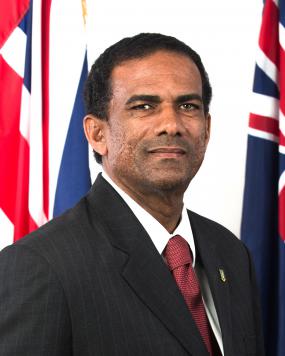Statement
INTERVENTION BY
DEPUTY PREMIER AND MINISTER FOR NATURAL RESOURCES AND LABOUR
DR. THE HONOURABLE KEDRICK D. PICKERING
Small Island Developing States Symposium
“Implementing the 2030 Agenda for Sustainable Development and the SAMOA Pathway in Small Island Developing States (SIDS): Equipping Public Institutions and Mobilizing Partnerships.”
FEBRUARY 21st2017
Nassau, Bahamas
 The British Virgin Islands (BVI) welcomes the opportunity to make an intervention at this plenary.
The British Virgin Islands (BVI) welcomes the opportunity to make an intervention at this plenary.
We are pleased that the dialogue on SIDS continues, particularly in the context of the Sustainable Development Goals (SDGs) and follow-up on the Samoa Pathway.
As a small island developing state (SIDS) we would like to share with you the initial steps the BVI Government is taking to prepare for the implementation of the SDGs, as well as the work we are already undertaking that will support meeting SDG targets.
Just last week BVI officials participated in a workshop in Jamaica for Caribbean SIDS which looked at integrating the SDGs into national development plans and how the implementation of the goals are to be monitored and measured. We will be carefully considering the workshops recommendations in our own national planning and seeking technical assistance from ECLAC.
We are grateful to (Economic Commission for Latin America and the Caribbean)ECLAC for our inclusion as an Associate Member of the regional commission and a Vice Chair of the Caribbean Development Coordination Committee (CDCC), particularly after much effort was made to gain acknowledgement that all SIDS require support due to their challenges, despite differences in political status.
Prime Minister Christie's comments on of the uniqueness of the Bahamas and also all of us.
We have certainly found our UN partners to be responsive and we are grateful for inclusion, particularly at the regional level.
While the SDGs are many, we will be placing a premium on SDG14 which will have the broadest impact on our society on account of the importance the sea and ocean play in our economic and social development.
As a tourism economy we are focusing on the sustainability of this sector which provides for the bulk of employment and GDP. Thus we are focusing on the management of our coastal and nearshore environment, conservation of our marine biodiversity and governance of our marine space.
We are doing this in part under the banner of sustainable tourism.
In 2014 we commissioned a study on the value of the environment to our tourism industry, which we estimate to be worth $200 million. Our marine biodiversity and cruising waters are at the core of this value as our main attractions so we cannot afford to see them degraded.
We have just recently taken the next step of commissioning a study on the value of the environment to the whole economy.
Once completed this study will provide us with the actual economic data we need to contribute to our SDG scoping exercise.
We are also currently developing a national oceans policy with technical support from the Commonwealth Secretariat which will provide a policy framework for the management of our 200 mile Exclusive Economic Zone (EEZ).
We are very keen that any unregulated fishing activity in our deep seas is brought into a regulated framework. We are also very focused on our sustainable yachting initiative. A strengthening of standards will be necessary to ensure the health of our seas and our people.
Nearer shore, we are undertaking a hydrographic study to map the seabed which will give us an indication of where our most precious and sensitive marine biodiversity lies so we can declare new marine protected areas to conserve them.
Understanding the value of our environment is absolutely critical for sustainable development.
Protecting our beaches and saltwater ponds is being strengthened and enhanced.
Closely tied to this, are our efforts to adapt to climate change. We are undertaking a costly effort to upgrade our drainage infrastructure to improve our resilience to stronger storms and heavier rainfall.
We have also adopted a sustainable energy policy with a target of renewables making up 33% of our energy mix over the next decade. IRENA (International Renewable Energy Agency) support under the SIDS Lighthouse Initiative has been tremendously helpful in this regard.
Forthcoming EU support will also be helpful in these areas, although limited.
We have many partners with whom we will continue to work on the sustainable development agenda. The Caribbean Challenge Initiative (CCI) is a specific example.
I hope this gives you a flavour of the progress we are making in our preparations to implement the SDGs.
The main requirement of the BVI in this process is technical assistance to support our efforts.
We ask that our international partners remain open to supporting associate members of the regional commissions in this regard.
I thank you for your attention.

